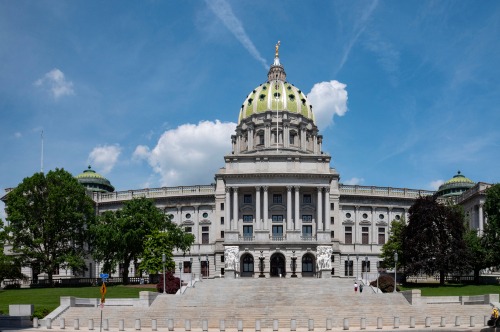
Pennsylvania Senate Republicans last week gave a one-two punch to the Wolf administration’s plan to have the state join the Regional Greenhouse Gas Initiative (RGGI).
RGGI, a multi-state compact designed to enact a carbon tax on energy producers, would create higher energy bills for Pennsylvanians and energy industry job losses, according to the Senate Republicans, who have fought Gov. Tom Wolf every step of the way on joining the initiative.
In fact, the lawmakers say Wolf’s effort to enter the RGGI by Executive Order through regulation bypassed the normal legislative process, making Pennsylvania the only state to attempt to enter RGGI without legislative approval.
In punch No. 1 last week in the ongoing fight against joining the RGGI, Senate Republicans on Feb. 25 filed a request with the state’s Commonwealth Court asking it to intervene in the Wolf administration’s lawsuit to force Pennsylvania into the initiative.
“There are clear rules in place to prevent any branch of government from trampling the rights of Pennsylvanians and the authority of the other branches of government,” the four lawmakers said in a joint statement issued on Friday. “Governor Wolf should not be permitted to ignore those rules just because he thinks those checks and balances are inconvenient to his liberal, anti-energy agenda.”
The request was filed by Pennsylvania Senate President Pro Tempore Jake Corman (R-34), Senate Majority Leader Kim Ward (R-39), Senate Appropriations Committee Chair Pat Browne (R-16), and Senate Environmental Resources and Energy Committee Chair Gene Yaw (R-23), who are leaders in the Pennsylvania Senate Majority Caucus.
“It is deeply disturbing that the Wolf administration continues to ignore the will of the people and is actively working to raise energy taxes and costs on Pennsylvania families and employers,” according to the members’ statement. “We must do everything in our power to prevent that from happening.”
Specifically, the GOP lawmakers want the court to intervene in a lawsuit recently filed by the Pennsylvania Department of Environmental Protection, which is suing the Legislative Reference Bureau and the Pennsylvania Code and Bulletin in an effort to force them to immediately publish Wolf’s RGGI regulation in the Pennsylvania Bulletin.
Doing so would allow the RGGI regulation to take immediate effect and prevent the General Assembly from considering whether to override the governor’s Jan. 10 veto of a resolution passed by both the Pennsylvania Senate and the House of Representatives disapproving of Wolf’s RGGI regulation.
In their 145-page filing, the GOP lawmakers want the court to intervene and allow them, as “proposed intervenors” in the Wolf administration’s lawsuit, not to be deprived of their power to legislate. They say that granting the state Department of Environmental Protection’s request to publish the RGGI regulation “would abruptly terminate an ongoing process” under state law that “provides the General Assembly an opportunity to override the governor’s veto.”
“It creates a very slippery slope when the Executive Branch tries to create a new tax on Pennsylvania employers without the consent of the General Assembly,” the lawmakers said in their statement. “We will continue fighting to preserve the General Assembly’s authority to legislate and protect consumers against the painful consequences of the Wolf administration’s deeply flawed ideology.”
Second Punch
The other punch against joining the RGGI came from Yaw and State Sen. John Yudichak (I-14), who sent a Feb. 24 letter to the Independent Fiscal Office (IFO) requesting an audit of the modeling used to justify Pennsylvania’s entry into the initiative.
“Pennsylvania taxpayers, consumers and businesses deserve honest, accurate information about the proposed RGGI program and how it will impact their everyday lives,” said Yudichak, chairman of the Senate Community, Economic and Recreational Development Committee. “The plan is expected to substantially increase utility bills for every small business and homeowner in Pennsylvania.”
“Thousands of jobs will disappear. And zero carbon emissions will be removed from the atmosphere,” said Yaw, chairman of the state Senate Environmental Resources and Energy Committee. “Taxpayers deserve to know the true cost of the Wolf administration’s out-of-touch policies.”
Specifically, Yaw and Yudichak requested that IFO Director Matthew Knittel review and audit the modeling conducted by ICF International, including “the underlying assumptions and estimations relied upon by the Environmental Quality Board to justify Pennsylvania’s participation in the RGGI,” they wrote.
The lawmakers also told Knittel that their committees intend to hold a joint public hearing in late March and requested that the IFO participate to discuss its findings, according to their letter.
Yaw and Yudichak wrote that ICF International’s “erroneous assumptions” underlying the RGGI impact modeling conclusions will likely create much higher electric rates for all residents; more premature retirements of coal and older, less efficient natural gas plants; eliminate jobs; set “a likely insurmountable bar” to new natural gas plants being constructed in the state; and produce “potential grid reliability issues,” according to their letter.
They also wrote that unless the General Assembly can override Wolf’s veto of its resolution disapproving of RGGI participation, “the regulation will take effect within a matter of weeks.”
“We are hopeful that the IFO can assist the General Assembly in obtaining a more accurate and up-to-date understanding of RGGI’s likely impacts on Pennsylvania families, workers, businesses, and communities,” they wrote.
Yaw added that for more than a decade, the IFO’s independent analysis has been regarded as among the most trustworthy perspectives in state government. “The office’s projections will offer clarity on RGGI’s true economic impacts, given the Wolf administration’s repeated unwillingness to do so,” he said.